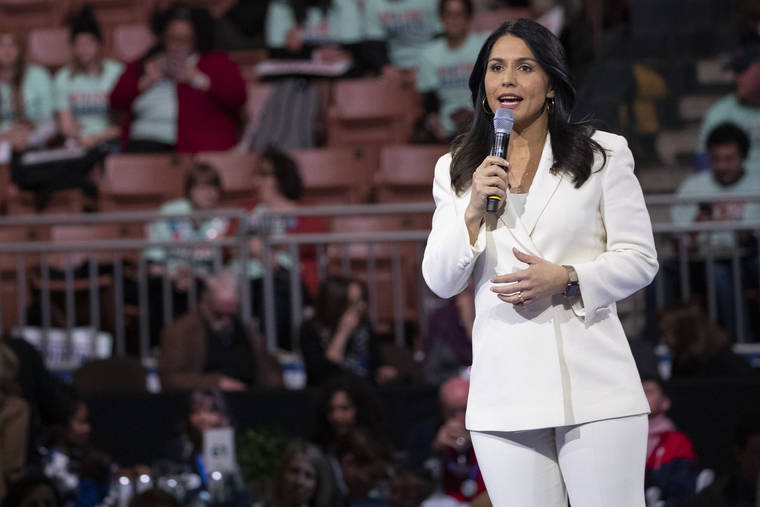U.S. Rep. Tulsi Gabbard was counting on New Hampshire to provide some momentum for her wobbly presidential campaign, but both the public opinion polls during the past week and the early election returns in the Granite State on Tuesday showed she wouldn’t get the political boost she needed.
Gabbard rented a house in New Hampshire late last year and attracted notice Opens in a new tab for staging more than 100 town hall gatherings and deploying an impressive array of yard signs and billboards in some New Hampshire neighborhoods.
But for all of her effort, poll data from early February compiled by the website FiveThirtyEight Opens in a new tab strongly suggested Gabbard was likely to secure something in the range of 3% to 6% of the vote in the New Hampshire Democratic primary, which would likely put her in sixth or seventh place in what is still a crowded field.
Colin Moore, director of the Public Policy Center at the University of Hawaii at Manoa, said Gabbard probably focused her efforts at New Hampshire because it’s a small state with a highly visible early primary, which offers an opportunity for national exposure without spending enormous amounts of money.
Gabbard has been unable to qualify for any nationally televised debates since November, and needs that boost.
New Hampshire also has a reputation for fiercely independent voters — many with a libertarian streak — and seemed likely to respond well to her criticisms of interventionist U.S. foreign policy and what Gabbard calls “regime change wars,” said Todd Belt, who is director of the political management program at George Washington University.
“She put all her eggs in New Hampshire. She didn’t really compete as hard in Iowa, and that does make sense because a lot of her appeal is sort of crossover appeal to Republicans and independents and especially to some libertarians,” Belt said. New Hampshire allows independents to vote in its Democratic primary.
Before the New Hampshire votes were counted, Gabbard suggested in a Tuesday email to supporters that she was pleased with the result of her efforts.
“Together, we’ve shown what happens when Democrats, Independents, Republicans, Libertarians and undecided voters stand united in our common cause to restore dignity, honor and service to the highest office,” she wrote in the campaign email. “To end regime change wars and the new Cold War, and to invest those trillions of dollars to meet the needs of the American people.”
In the end, Moore said he believes Gabbard was “crowded out” of the New Hampshire primary, at least in part because she was running against Vermont U.S. Sen. Bernie Sanders and Massachusetts U.S. Sen. Elizabeth Warren, who have a “certain hometown advantage.”
“She ran a good campaign, but she really never had a shot,” Moore said. “In terms of just evaluating strategic decisions that she made, they were good. I just don’t think there really was an opportunity for her to rise to the top group, and I think we’re going to see that in New Hampshire.”
The Democratic presidential campaign now rolls on to the Nevada caucuses and the South Carolina primary later this month, where Gabbard has less of a profile than she had in New Hampshire.
Gabbard told her supporters in a Tuesday email that she and her team will “hit the ground running tomorrow in Charleston,” but Moore said he does not expect her to perform well in South Carolina.
The significant African American voter base in South Carolina seems likely to lean toward former Vice President Joe Biden, and “I don’t really think those are the sort of voters who are looking for someone running against the Democratic Party,” Moore said.
“I think she’s in a bad situation right now because this was really her best bet to start catching fire,” Belt said as early returns were released in the New Hampshire primary.
“Frankly, (Amy) Klobuchar and (Pete) Buttigieg have been the ones to catch fire and not her, and it’s a big field and it’s hard to stand out on the big field, especially if you’re not getting on the debate stage,” he said.


 Stay updated on Hawaii and national elections coverage
Stay updated on Hawaii and national elections coverage